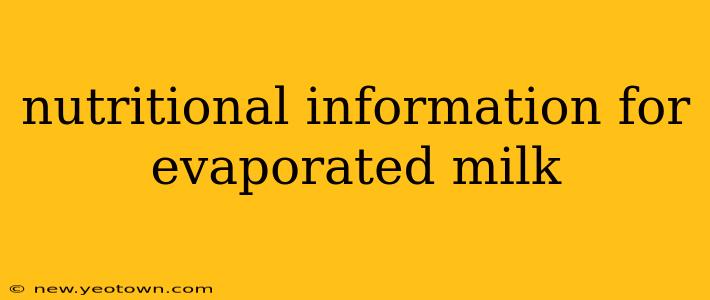Evaporated milk. That creamy, slightly sweet, canned staple. It's a pantry workhorse, readily transforming into everything from creamy sauces to decadent desserts. But beyond its culinary versatility, what's the nutritional story behind this condensed dairy delight? Let's dive in.
What is Evaporated Milk, Exactly?
Before we delve into the numbers, let's clarify what evaporated milk actually is. It's essentially cow's milk that has had about 60% of its water removed through evaporation. This process concentrates the milk solids, resulting in a richer, thicker texture. Often, a small amount of vitamin D is added back after processing. This isn't the same as sweetened condensed milk, which includes added sugar.
Nutritional Information: A Closer Look
A typical 1/2 cup serving of evaporated milk (unsweetened) boasts a nutritional profile that includes:
- Calories: Roughly 130-140 calories. This can vary slightly depending on the brand.
- Fat: Around 8 grams, a significant portion of which is saturated fat.
- Protein: A good source of protein, offering approximately 8 grams per serving.
- Calcium: Provides a substantial amount of calcium, important for bone health.
- Vitamin D: Often fortified, contributing to calcium absorption and overall bone health. (Check the label for specifics as this is not always added).
How Does Evaporated Milk Compare to Other Milks?
Compared to other milk types, evaporated milk stands out in its concentrated nature. It has a higher calorie and fat content than regular milk but also packs a more substantial punch of protein and calcium in a smaller volume. It's a worthwhile comparison to consider when planning your dietary intake.
Is Evaporated Milk Healthy?
This is a question with a nuanced answer. Evaporated milk certainly provides essential nutrients, but its higher fat and calorie content mean moderation is key. It's a perfectly acceptable part of a balanced diet, especially if you prioritize protein and calcium intake. However, individuals watching their saturated fat intake or calorie consumption might opt for lighter alternatives.
What are the Different Types of Evaporated Milk?
While the standard variety is readily available, some brands offer variations. These might include:
- Fat-free or low-fat evaporated milk: These options reduce the fat and calorie content, making them a suitable choice for those focusing on weight management.
- Organic evaporated milk: Made from milk sourced from organically-raised cows, meeting specific standards for farming practices.
Always check the nutrition label on the specific brand you are using as values can slightly differ.
What are the Benefits of Evaporated Milk?
The benefits extend beyond its simple nutritional value:
- Longer shelf life: The evaporation process extends the milk's shelf life significantly, making it a convenient pantry staple.
- Versatile in cooking: Its rich texture makes it ideal for sauces, soups, and baked goods, adding creaminess and depth of flavor.
- Affordable: Often more budget-friendly than other milk alternatives.
Can I Use Evaporated Milk as a Milk Substitute?
While not a one-to-one replacement for regular milk in all applications, evaporated milk can often be substituted, although you may need to adjust the recipe to account for its thicker consistency and richer flavor. Remember to dilute it with water as needed.
Are There Any Downsides to Evaporated Milk?
The higher fat content and calorie density are the main drawbacks. For individuals managing their weight, cholesterol, or saturated fat intake, careful consideration is essential.
Evaporated milk offers a unique combination of nutritional benefits and culinary versatility. Understanding its nutritional information empowers you to incorporate it mindfully and enjoy its creamy goodness as part of a balanced diet. Remember to always check the specific nutritional label for the brand you purchase, as variations can occur.

